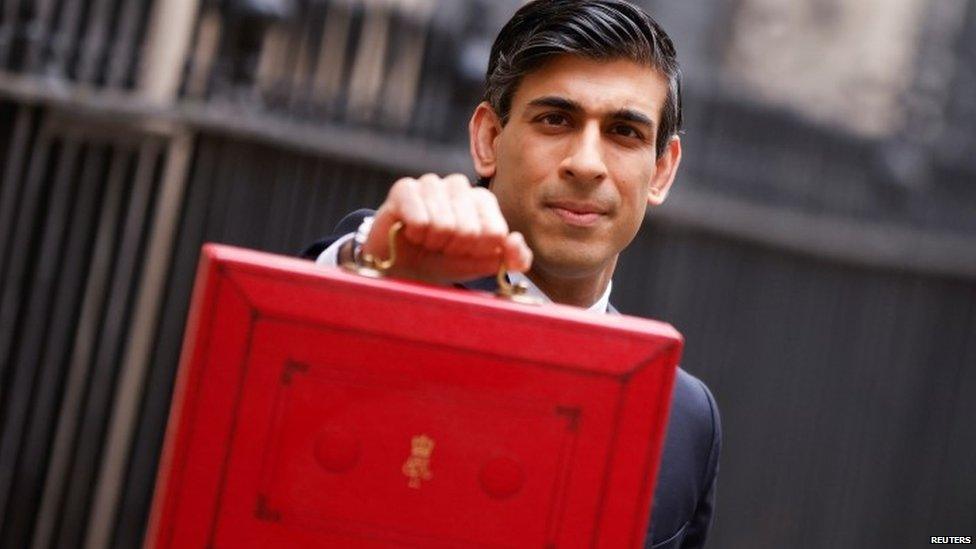Budget 2021: Stamp duty holiday deadline 'may cost us £12,000'
- Published

Simon Ashley and his twin boys - Ralph and Henry - need more room
Speculation is rife about a possible extension of the stamp duty holiday in England. Tens of thousands of property buyers have urged Chancellor Rishi Sunak to offer help. Earlier this month the BBC spoke to some of them.
With twin boys approaching the age of two, Simon Ashley and his wife Katie soon realised they needed more space at home.
So the family decided to take advantage of the stamp duty holiday and move to a bigger property just outside Harrogate.
The chain was quickly settled, and they thought they would be in their new home by Christmas.
But, with many thousands of people also planning to move during the pandemic, they now face a race to beat the tax break deadline at the end of March.
"The stamp duty holiday is a big thing for us. To put it bluntly, the impact is just over £12,000," said Simon, aged 34. "It is making us nervous.
"The problem we have being in a chain is that we don't know how it will affect the people below us. It could stop it all, which will be terrible."
Deadline looms
The tax concession in England and Northern Ireland means no stamp duty is paid on the first £500,000 of a property sale.
In Scotland, where the equivalent levy is called the Land and Buildings Transaction Tax, and in Wales, where buyers pay Land Transaction Tax, there have been temporary tax breaks too.
All are set to return to their pre-pandemic thresholds on 1 April.
For buyers - particularly those in more expensive areas, or buying larger properties - that will mean the end of a tax saving of up to £15,000.
Data from property portal Zoopla, for the BBC, suggests that between 70% and 82% of sales would be stamp duty free if they completed by the end of March.
That, and savings at the higher end of the market, created a surge in activity. In turn, that meant professionals in the sector, from surveyors and solicitors, to local councils and estate agents, were all busy.
The extra workload, at a time when many faced Covid-related staff shortages and practical working restrictions, meant delays in the house-buying process.

Nigel Moore and Fergus the border collie are moving to the coast
That affected families like the Ashleys and many thousands of others, like Nigel Moore.
He is typical of a trend as people look to move out of the city to the country or coast, with regular working from home set to continue.
Plans to move to the north Norfolk coast with wife Ashley-Jane and border collie Fergus have been brought forward by years, but then delayed too by the stamp duty rush.
He says he is "looking closely at the diary", hoping to complete in time, but - as he works in the mortgage industry - he knows others will not be so lucky.
Estimates suggest that as many as 300,000 sales could fall through because the stamp duty break will expire - although there is no way of knowing yet how accurate that prediction will be.
Zoopla predicts that there will be a sudden drop-off in sales, with an expectation of 20% fewer transactions between April and June compared with the first three months of the year.

That so-called cliff-edge has prompted lobbying of ministers - and particularly of the chancellor, Mr Sunak - to extend the tax breaks.
A petition, set up by a buyer whose new home will not be built in time, is calling for a six-month extension to the stamp duty holiday. It has been signed by nearly 150,000 people.
'Only temporary'
Some in the housing sector suggest that will just create another cliff-edge, but six months later, and so they want the chancellor to think a little more imaginatively.
Beth Rudolf, from The Conveyancing Association, said: "What we'd really like is for anybody who is already in a transaction to still receive the stamp duty concession when they complete. It is all about trying to bring fairness back."
This so-called tapering, to allow buyers ready to complete to benefit, could stop the sudden drop in activity seen after stamp duty concessions used by previous chancellors. It may also stop pressure on sellers to drop their price to ensure a sale.
Finance ministers in Scotland and Wales have confirmed their plans to cancel the tax break at the end of March, giving people time to prepare, and there is still little sign of Mr Sunak doing things any differently at next month's Budget.
A Treasury spokesman said: "The temporary stamp duty cut is helping to protect hundreds of thousands of jobs which rely on the property market by stimulating economic activity.
"Its time limited nature is what has encouraged people to take advantage of the scheme."
For people like Simon Ashley, who says the money he has saved would be pumped back into the economy, that time limit may be coming a bit too soon.
- Published2 April

- Published26 October 2021
